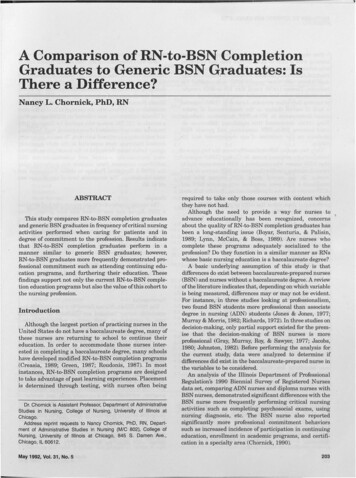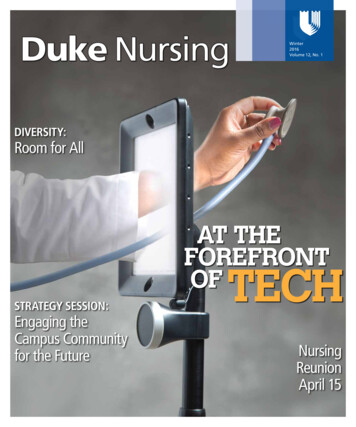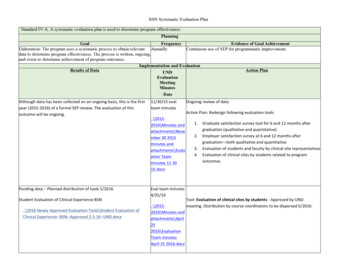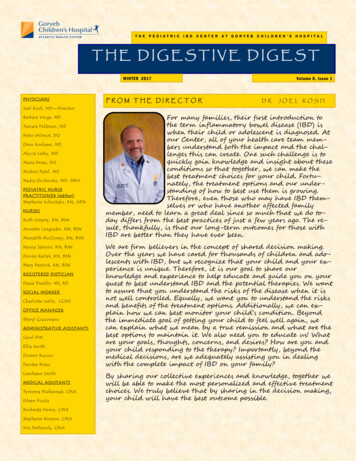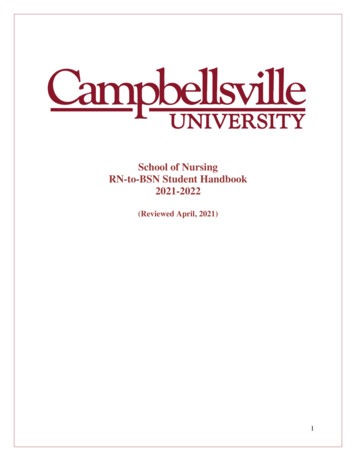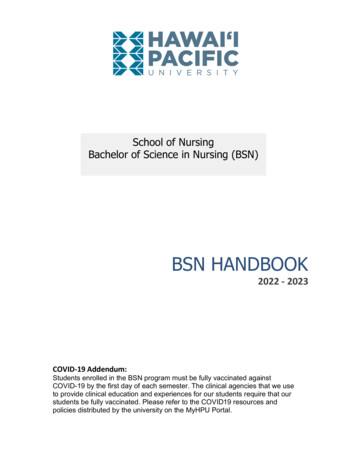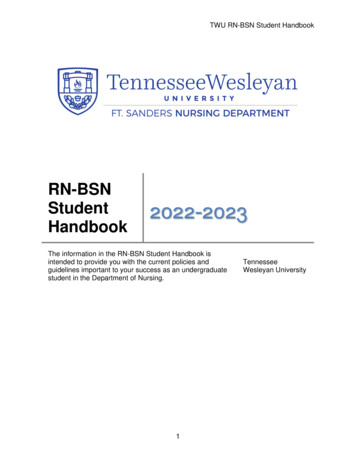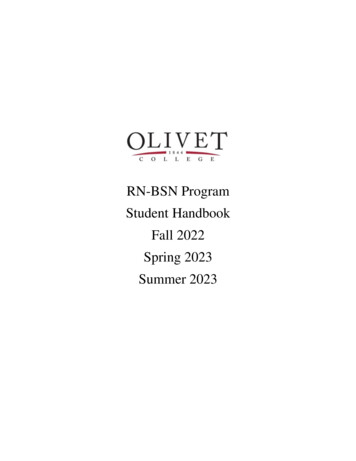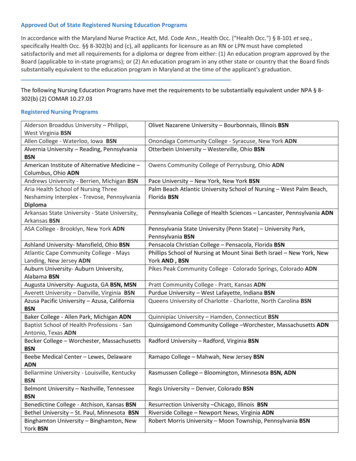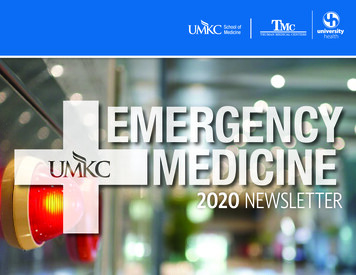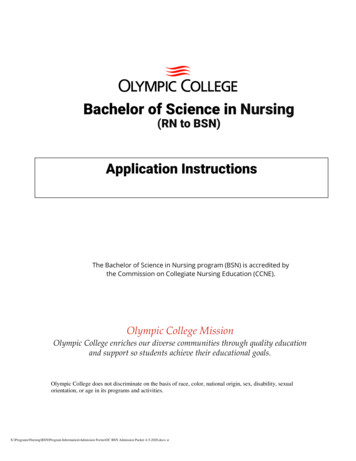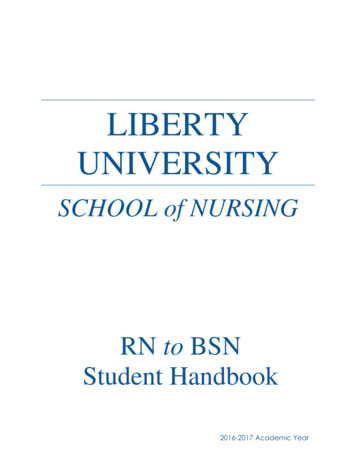
Transcription
LIBERTYUNIVERSITYSCHOOL of NURSINGRN to BSNStudent Handbook2016-2017 Academic Year
Table of ContentsLiberty University Information . 2Statement of Mission and Purpose . 3Statement of Essential Attributes . 4Overview of the RN-BSN Program . 7Expectations for Faculty, Staff, and Students . 10RN-BSN Admission Information. 13Transcript Evaluations and Transfer Policy . 13Background Check and Licensure Verification . 14Curriculum Objectives . 14RN-BSN Course Information. 15Grading and Important Policies . 22Resources . 24Registration and Payment . 261
Liberty University InformationTHE UNIVERSITYLiberty University is the largest private, nonprofit university in the nation, the largest university inVirginia, and the largest Christian university in the world. Nestled in the Blue Ridge Mountains onmore than 7,000 beautiful acres in Lynchburg, VA, Liberty offers over 590 programs from thecertificate to the doctoral level, and is home to more than 110,000 residential and onlinestudents.ACCREDITATIONLiberty University is regionally accredited by the Commission on Colleges of the SouthernAssociation of Colleges and Schools (SACS-COC) to award degrees at associate,baccalaureate, master’s, education specialist and doctoral levels. The School of Nursing offersa generic residential Bachelor of Science in Nursing (BSN) degree, a RN to BSN degree, a Masterof Science in Nursing (MSN) degree and a Doctor of Nursing Practice degree which are all fullyaccredited by the Commission on Collegiate Nursing Education (CCNE) and approved by theVirginia State Board of Nursing.ACADEMIC FACILITIESThe Arthur S. DeMoss Learning Center houses several large lecture halls, modern classrooms, andsimulation labs. The School of Nursing is housed on the second floor of DeMoss Hall and includes32,300 square feet, an OB Theater equipped with a birthing mannequin, health assessment suitesand an interactive team spot/classroom spot.LOCATIONIn the heart of Virginia, Liberty University is located in Lynchburg on the south banks of the historicJames River with the scenic Blue Ridge Mountains as a back drop. The city is over 200 years oldand is noted for its culture, beauty, and educational advantages. Lynchburg is at thecrossroads of U.S. highway 29 and 460 and has adequate transportation facilities via bus,railway, and air.2
Statement of Mission and PurposeMaintaining the vision of the founder, Dr. Jerry Falwell, Liberty University develops Christ-centeredmen and women with the values, knowledge, and skills essential to impact the world.Through its residential and online programs, the University educates men and women who willmake important contributions to their workplaces and communities, follow their chosenvocations as callings to glorify God, and fulfill the Great Commission.Liberty University will:1. Emphasize excellence in teaching and learning.2. Foster university-level competencies in communication, critical thinking, information literacy,and mathematics in all undergraduate programs.3. Ensure competency in scholarship, research, and professional communication in all graduateprograms.4. Promote the synthesis of academic knowledge and Christian worldview in order that theremight be a maturing of spiritual, intellectual, social and physical value-driven behavior.5. Enable students to engage in a major field of study in career-focused disciplines built on asolid foundation in the liberal arts.6. Promote an understanding of the Western tradition and the diverse elements of Americancultural history, especially the importance of the individual in maintaining democratic and freemarket processes.7. Contribute to a knowledge and understanding of other cultures and of international events.8. Encourage a commitment to the Christian life, one of personal integrity, sensitivity to theneeds of others, social responsibility and active communication of the Christian faith, and, as it islived out, a life that leads people to Jesus Christ as the Lord of the universe and their ownpersonal Savior.3
Statement of Essential AttributesStudents of nursing have a responsibility to society in learning the academic theory and clinicalskills needed to provide nursing care. The clinical setting presents unique challenges andresponsibilities while caring for human beings in a variety of health care environments. ThisStatement of Essential Attributes is based on an understanding that practicing nursing as astudent necessarily involves an agreement to uphold the trust which society has placed in us(ANA Code of Ethics for Nursing Students, 2015. The following statements are standards thatcomprise four core essential student nursing competencies. In addition to academicqualifications, the Liberty University School of Nursing considers the ability to consistentlydemonstrate these personal and professional attributes essential for entrance to, continuation in,and graduation from its nursing degree programs.Physical AttributesNursing students must possess sufficient motor and sensory skills to provide safe nursing care andparticipate in the classroom and clinical experiences deemed necessary to meet bothprofessional nursing practice standards and academic nursing program standards. Studentsmust be able to: (Motor) Move throughout the classroom/clinical site and stand for periods of time tocarry out patient care activities; be physically capable of performing patient care dutiesfor up to 12 hours at a time, day or night; and lift 50 pounds. (Vision) See and accurately read print, computer screens and hand writing, includingpatient care orders and other documents, and demonstrate the ability differentiatecolors. (Hearing) Hear and differentiate tonal variances or do so with the assistance oftechnology such as an amplified stethoscope. (Smell) Differentiate smells, such as smoke, bodily fluids and other odors. (Tactile) Accurately distinguish texture, temperature, pulsations, and moisture, with orwithout gloves. (Gross/Fine Motor) Manipulate equipment and tools necessary for providing safe nursingcare such as medical equipment/devices, syringes/needles, stethoscope andcomputers.Cognitive AttributesNursing students must exhibit sufficient knowledge and clarity of thinking to process theinformation and apply it appropriately to situations in classroom and clinical experiences.Students must be able to:4
Learn effectively through a variety of modalities including, but not limited to, classroominstruction, small group discussion, group assignments, individual study of materials,preparation and presentation of written and oral reports and use of computer basedtechnology. Assimilate knowledge acquired through the modalities above and effectively apply thatknowledge in clinical settings for a variety of individual, family or community needs andproblems. Write and comprehend both spoken and written English. Speak English well enough to understand content presented in the program, adequatelycomplete all oral assignments, and meet objectives of assigned clinical experiences. Accurately apply basic mathematical skills such as ratio/proportion concepts, use ofconversion tables and calculations of drug doses and solutions. Organize thoughts to communicate effectively through written documents that arecorrect in style, grammar, spelling, mechanics, and American Psychological Association(APA) referencing. Gather data, develop a plan of action, establish priorities and monitor treatment plans. Utilize appropriate judgment and critical thinking behaviors such as properlyincorporating previous knowledge from a wide range of subject areas into currentpatient care situations.Interpersonal AttributesNursing students must possess ability to identify behaviors and attitudes in themselves and others,as well as to self-regulate their own behaviors and attitudes, to ensure professional practice anddelivery of care. Students must be able to: Establish rapport with individuals, families, and groups. Respect individual differences such as cultural, ethnic, religious, gender, age, and sexualorientation. Relate effectively to other students, faculty, university/hospital staff and patients/familiesto fulfill ethical obligations of the nursing profession including altruism, autonomy, humandignity, integrity, and social justice. Negotiate interpersonal conflicts effectively. Maintain sufficient mental/emotional stability to tolerate stressful situations, adapt tochanges, respond to the unexpected, maintain objectivity and recognize personalstrengths and limitations consistent with safe clinical practice so as to ensure no directthreat to the health or safety of others. Sustain safe nursing practice without demonstrated behavior of addiction to, abuse of ordependence on alcohol or other drugs that may impair behavior or judgment. Preserve confidentiality in regards to collaboration and patient care. Maintain professional relationships and expectations in all areas of student life, includingacademic, work and personal.5
Critically examine and self-edit social media content posted and hosted with theunderstanding that they impact both educational and professional opportunities whilerefraining from posting distasteful, offensive, immoral, unethical, or confidential content. Accept appropriate ownership of responsibility for their own actions and for the impactof these actions on others. Abide by the American Nurses Association Code of Ethics (located mance AttributesNursing students must be able to maintain clinical agency, university and nursing programperformance standards while upholding and enhancing the reputation of the nursing programsand the university at large. Students must be able to: Continuously exhibit a functional state of alert, self-aware, and respectful behaviorduring classroom and clinical experiences. Perform multiple assignments/tasks concurrently and in a timely manner. Provide patient safety in various stressful situations and settings which may be physicallyand emotionally demanding. Arrange travel to and from academic and clinical sites, both local and distant. Tolerate the mental demands of differing shifts, body rhythm changes, increasinglydifficult patient workloads and fatigue. Timely submit required medical and certification documents to online database. Critically think and concentrate with ability to respond quickly to changes in patient andunit conditions. Maintain integrity of the Liberty University nursing uniform, which is to be worn only in itsentirety in approved clinical and academic settings. Comply with all applicable Occupational Safety and Health Administration (OSHA) andHealth Insurance Portability and Accountability Act (HIPAA) standards.6
Overview of the RN-BSN ProgramThe RN-BSN curriculum consists of 120 credits of which 43 credits are general educationrequirements, 12 credits of science support courses, 4 credits of electives and 61 credits ofnursing courses. Registered Nurses participating in the online nursing program receive 31 creditsof advanced nursing credit once they are accepted into the program. These credits are givenfor a United States RN License in good standing. Additional transfer credit may also be appliedto the non-nursing courses for previous coursework.The nursing program is designed to provide individuals with a broad educational background,which builds upon Biblical experiences, liberal arts, behavioral and social sciences as well asnursing. The curriculum for the nursing program at Liberty University is directly derived from thestated purpose, philosophy, objectives, and organizing framework of the School of Nursing whichis based on Patricia Benner’s theory on the nursing process. It provides a framework for practiceand a conceptual approach to the nursing curriculum.PURPOSE STATEMENTThe purpose of the Liberty University School of Nursing Undergraduate program is to preparebaccalaureate level nurses who are committed to Christian ethical standards and view nursingas a ministry of caring based on the Benner theoretical framework. The nursing curriculum is builtupon a foundation from the arts, sciences, and the Bible; as such it focuses on the use of thenursing process to guide the acquisition of nursing knowledge, the development of strongclinical skills, and a commitment to a sound work ethic.PHILOSOPHY OF THE SCHOOL OF NURSINGThe primary goal of the Liberty University School of Nursing is to educate Christian students tominister to others through nursing. The Nursing Department supports the following propositionsbased on the Bible, nursing process, and Patricia Benner’s Nursing Theory.God, the infinite source of all things, has shown us truth through Christ in nature, history andabove all in Scripture.Persons are spiritual, rational, moral, social, and physical, created in the image of God. Personsare self-interpreted beings who become defined as they experience life, having the capacity tobe in a situation in meaningful ways because of embodied intelligence.7
Nursing is a multiform activity that provides a wide range of health care to society. It revolvesaround the need for assessment, goal development, selection of interactions, delivery of care,and evaluation of responses. Nursing is a healing art communicated through the ministry ofcaring. The practice of professional nursing is defined by the seven domains of nursing roles:1 The Helping Role2 The teaching-coaching function3 The diagnostic and patient monitoring function4 Effective management of rapidly changing situations5 Administering and monitoring therapeutic interventions and regimens6 Monitoring and ensuring the quality of health care practices7 Organizational and work-role competenciesStress is the individual’s perception physically, emotionally, or intellectually that smooth functionhas been disrupted. Harm, loss, or challenge is experienced and sorrow, interpretation, or newskill acquisition is required. Coping is a person’s response to stress.Caring is primary because it sets up what matters to a person, what counts as stressful, and whatoptions are available for coping. Involvement and caring may lead one to experience loss andpain but they also make joy and fulfillment possible. Distance, control, and equanimity in themidst of suffering can trivialize distress.Ministry is showing the love of Christ to others through service so that they may be drawn to Him.Health is an individualized perception that can be interpreted differently by each individual.Since health is influenced by societal and cultural norms, it is important to consider bothsubjective and objective assessments of health.Baccalaureate nursing education prepares the nurse to function in an active, participant role inthe health care system. Nursing prepares the individual to be a leader, to be responsible, and tobe accountable for his or her own actions. It also prepares the individual to think critically,problem solve, and make decisions for the provision of health care. Professional nursingprepares the individual to function both independently and in collaboration, coordination, andconsultation with other disciplines.The faculty of the School of Nursing believes that the baccalaureate degree is the minimumeducational level of preparation for the professional nurse. The baccalaureate educationprepares the graduate to enter professional nursing by providing a broad base in thehumanities, social and natural sciences, and the knowledge, values and skills necessary forbeginning practice in primary, secondary, and tertiary health care.Courses in sociology, psychology, philosophy, and religion assist the individual to understandpeople, families, and groups within the community and to view matters in a broader context.Courses in natural science assist the individual in thinking critically. Courses in religion, theology,8
evangelism, and Christian service enhance the individual’s understanding of God - His creationand His will. They contribute to the development of a sense of caring as a ministry to others aswell as fostering a commitment to the Christian life.The nursing faculty believes that teaching and learning are interdependent lifelong processes.Learning is a progressive and cumulative experience producing beneficial changes in behavior.Learning takes place in three domains: cognitive, affective, and psychomotor or performance.Motivation and readiness are necessary in classroom environment if learning is to take place.It is the faculty’s responsibility to oversee and assess individual learning needs and adaptteaching methods as students progress from novice to advanced beginners.As facilitators of student learning, faculty must demonstrate advanced clinical judgmentpointing out important cues and assisting students to think critically about clinical situations.Excerpts taken from:Benner, Patricia. (1984). From Novice to Expert: Excellence and power in ClinicalNursing Practice. Menlo Park, CA: Addison-Wesley Publishing Co.Benner, Patricia. (1989). The Primacy of Caring: Stress and Coping in Health andIllness. Menlo Park, CA: Addison-Wesley Publishing Co.9
Expectations for Faculty, Staff, and ManifestationsLOVEI sacrificially and unconditionally love andforgive others (John 15:12-13) Demonstrate the love of God byexhibiting compassion and a positivespirit in all interactions. Foster an environment of peace,walking with the Holy Spirit andupholding others in prayer.RESPECT I understand that each person I interact withis someone who is so precious in God’s sightthat he gave his only son to die for him/her.(1Thess. 4:11-12) Demonstrate respect and a positivespirit when interacting with others inwritten and oral communication.Support the mission and leadership ofthe school and the department bysubmitting to leadership decisions andfollowing the chain of command.Acting in an ethical and moralmanner.Respond to email communicationswithin 24 hours.Demonstrate integrity by holding eachother accountable in loving and Christcentered ways as evidenced by:Maintaining confidentiality,professionalism, and discretionChoosing honesty inside andoutside the classroomDisplaying promptness andresponsibility in attendance forclass and deadlines- Showing the self-discipline andwork ethic essential for beingprepared and organized forsuccessfully completingassigned responsibilities.JOYI have inner contentment and purpose inspite of my circumstance (Psalm 100:1-2,James 1:2-3)PEACEI am free from anxiety because things areright between God, myself and others.(Hebrews 12:14, Romans 12:18, Romans 14:19)INTEGRITYI do the right thing, even when no one iswatching.(Proverbs 4:23-27, 1Chronicles 29:17a) CONTENTMENTI am confident that God has good plans forme regardless of how my circumstances maylook at the present time.(Phil 4:11-13, 1 Timothy 6:6) Effectively manage personal emotionsand feelings and react reasonably tosituations10
PATIENCE I take a long time to overheat, and I endurepatiently the unavoidable pressures of life.(Ephesians 4:2) COMPASSIONI am filled with the love of Christ and wantothers to know his love like me.FAITHFULNESS I have established a good name with Godand with others based on my long-termloyalty to that relationship.(Hebrews 11:6; 1 Corinthians 4:2; 2 Corinthians5:7)PERSEVERANCE I do not give up on people or projects(Hebrews 12:1b-2a) HOPEDemonstrate the belief that everyonecan learn.Provide opportunities and motivationfor everyone to learn.Demonstrate empathy and sensitivityto human needs as evidenced by:Discernment in clinical,classroom and office situationsSupporting colleagues- Recognizing the value wehave in Christ, realizing thatothers may be dealing withindividual life circumstancesthat are difficult to handle.Demonstrate faithfulness to the Lordand the university and support thevirtues of the department asevidenced by:Taking responsibilities seriouslyCompleting assigned tasks on timeFollowing through oncommitments- Attending convocation, meetingsand assigned tasksDemonstrate a commitment to otherssuccess.Encourages othersDemonstrate a commitment toexcellence.I can cope with the hardships of life anddeath because of the hope I have in JesusChrist. (Romans 12:12)KINDNESS/GOODNESS/GENTLENESS I choose to do the right things in myrelationships with others.(Col. 3:12; Ephesians 4:32) SELF-CONTROL I have power through Christ to control myself.(1 Cor. 6:12)HUMILITYI choose to esteem others above myself(Proverbs 15:33) Demonstrate a hospitable attitude inword and action.Display positive tone and attitude inverbal and written communication.Effectively manage personal emotionsand feelings and react reasonably tosituations.Act confidently and maturely.Accept constructive feedback in arespectful, appropriate manner.Speak to others in an edifying way in aneffort to lift them up.COURAGE11
With knowledge that God is beside me, I amcourageous when facing my challenges andfears. Psalm 31:24.GENEROSITYI sacrificially give to God through the giftingof my talents, time, and finances. Eph 1:3. I gladly bless others in the way God hasblessed me.I rejoice when using my God-given talents.I face challenges knowing that God is bymy side.I encourage others to overcome theirfears.12
RN-BSN Admission Information All policies and procedures as stated in the current Liberty University Catalog applyunless otherwise stated. Students who are admitted into the RN to BSN program must first meet certainprerequisites before they may begin registration for nursing classes. Admissionrequirements are listed below. Liberty University Online ApplicationRN licensure in state of residence (copy of licensure document)o Active and CurrentOfficial transcriptsMust be a graduate of a NLN Accredited nursing program leading to an associatedegree or hospital diploma.Ability to meet essential attributes requirements.Upon acceptance into the program and United States RN licensure verification, 31 hours ofadvanced credit will automatically be applied toward students’ Bachelor of Science in Nursing.See the RN to BSN degree plan for additional course informationCREDIT FOR RN LICENSURENURS 105NURS 221NURS 305NURS 306NURS 301NURS 302NURS 352NURS 353NURS 460Medical TerminologyFundamentals of NursingPharmacology IPharmacology IIStrategies for Adult Health Care IStrategies for Adult Health Care IICaring for the Childbearing Family ICaring for the Childbearing Family IIAdvanced Strategies for Adult Health CareTOTAL1 credit4 credits2 credits2 credits5 credits5 credits4 credits4 credits4 credits31 creditsTranscript Evaluations and Transfer PolicyTRANSFER POLICY Students may transfer in general elective and investigative studies into the RN to BSNprogram.Upon verification of licensure and acceptance into the RN to BSN program students willreceive 31 credit hours of advanced credit for their previous experience (course listedunder credit for previous experience).Apart from the 31 credit hours of advanced credit, students must complete all nursingclasses through Liberty University (unless an appeal is approved through the programchairperson). Students must also complete at least 30 credit hours through Liberty in orderto graduate from the university.13
TRANSCRIPT EVALUATION APPEAL Student must contact school regarding course(s) in question and obtain a coursedescription and objectives from the semester the course was taken.Student must complete transfer evaluation inquiry form and submit to LUO transfer officefor review.Transfer Evaluations will communicate with student regarding appeal.REQUEST TO TAKE COURSES AT ANOTHER INSTITUTION Fax, mail, or email course description and/or syllabus with the name of the regionallyaccredited school, along with the RTTAC form (request to take courses at anotherinstitution) to the LUO transfer office.Transfer Evaluations will contact student with decision.Background Check and Licensure VerificationIn an effort to continue strengthening the RN-BSN Program, a background check and RNLicensure verification has been incorporated in the foundation course, Advanced NursingCommunication. Castle Branch, Inc (Certified Background) is the company providing theservice to students to complete this requirement. A link will be provided within this course alongwith steps for setting up an account with Certified Background and requesting the backgroundcheck. There will be two packages to choose from: US Criminal Background Check (which includes Professional RN LicenseVerification) 20.80 additional fees may applyCompletion of the background check and RN Licensure verification is required prior tocontinuing in additional nursing courses.In the event that a background check reveals flagged information, the student will becontacted for further details, and the School of Nursing will decide whether the student maycontinue forth in the RN-BSN Program or be dismissed as a result of the flagged information.Students are encouraged to contact their RN-BSN Advisor with any questions.Curriculum ObjectivesUpon completion of the Liberty University RN-BSN program, the graduates will: View Nursing as a ministry of demonstrating Christ’s love to hurting people of all religions,creeds and cultures.Provide and coordinate nursing care for individuals, families, and groups within thecommunity.14
Utilize critical thinking/problem solving skills in determining nursing interventions andapplying therapeutic skills.Demonstrate leadership skills in collaboration with clients, other professionals, and groupswithin the community for the purpose of promoting, maintaining and restoring health.Apply a personal and professional Christian value system, based on Biblical principles, toethical issues related to the practice of professional nursing.Value the need for ongoing personal and professional development through both formaland informal learning experiences.Foster professional level competencies in writing, oral communication and computerliteracyMAJOR CURRICULAR CONCEPTSNursing as a MinistryServant’s HeartPatient Centered CareCritical Thinking/ProblemSolving SkillsNursing ProcessEvidence-Based PracticeMultisystem IntegrationSafetyInformaticsLeadership SkillsTeamwork and CollaborationQuality ImprovementEmotional IntelligenceRN-BSN Course InformationPROGRESSION, RETENTION, DISMISSALEqually important to the admissions requirements into the nursing program are those criteriawhich govern maintenance of the student’s status once admission is achieved. These criteria arelisted below. Minimum grade of “C” in all nursing courses. If a student fails a nursing course, they mustrepeat the course while enrolled in the program. The second failure of a nursing course, agrade less than a “C”, will result in dismissal from the nursing program.Satisfactory citizenship and behavior must be maintained. Students may be suspendedfrom the university for unethical or inappropriate behavior. Suspensions are subject tofaculty review, and can result in dismissal from the RN-BSN program.Students are encouraged to follow course sequence.15
SEQUENCE OF NURSING COURSESNURS 220 Advanced CommunicationNURS 220 is the foundation course for the RN-BSN program and is the required first nursing course. Students will learn howto write at the professional level, utilizing American Psychological Association (APA) format. Success in subsequentnursing classes is fostered by completing this course first.NURS 210 Health AssessmentNURS 215 PathophysiologyNURS 225 Research in NursingNote: Completion of all Science classes is strongly suggested prior to taking NURS 210 & NURS 215.NURS 325 Nursing ConceptsNURS 440 Strategies for Community Health CareNURS 445 Population HealthNURS 489 Leadership in NursingNURS 491 Nursing ManagementIt is suggested that NURS 440, 445, 489 and 491 be taken after the research course. Students should keep in mind thatNURS 440 is a five credit class and it is highly recommended to take this course alone.NURS 492 Advanced Concepts of Nursing PracticeNURS 492 is the capstone course for the RN-BSN and must be the last nursing course in a student’s plan of study. All othernursing courses must be complet
The RN-BSN curriculum consists of 120 credits of which 43 credits are general education requirements, 12 credits of science support courses, 4 credits of electives and 61 credits of nursing courses.
